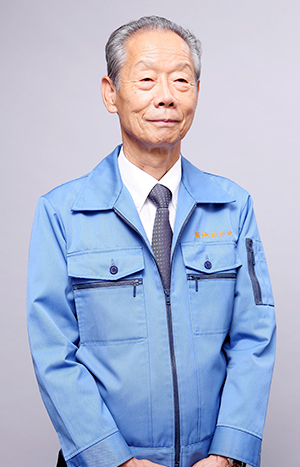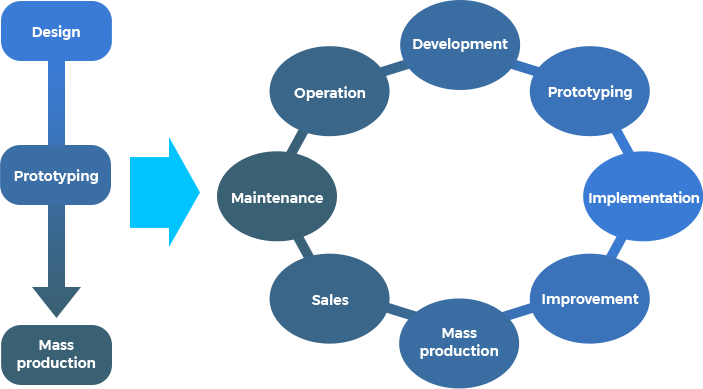A three-minute introduction to Kikuchi Seisakusho
Vision
Establishment of the package solution system
motivated by the corporate philosophy of
trying new things

- What prompted the introduction of the package solution system?
- Kikuchi: Needless to say, we didn’t have it at the very beginning. It was the end result of adopting new technologies to provide customers with what they want and building up the required know-how.
- Are there any other companies in your industry that have adopted the same style?
- There are many specialized manufacturers in the prototype and tool & die industry, and each of them has their own area or specialty. In a segmented industry, it is a safe approach in commercial terms. I doubt that there are other prototype manufacturers who offer a package solution system like ours, either in Japan or anywhere else.
- So you really are the only company offering a package solution system. Why are you doing something that competitors don’t do?
- That’s just because we thought that would be interesting. If you have the whole picture of a process, you can see where the parts you make are put to use, and that would help motivate you to work and take pride in your work. That’s why we strove to offer total solutions to complete a certain unit of process and we took the risk to invest in machinery to expand our business.
- So that’s “a vigorous spirit to take on challenges,” a phrase from your corporate philosophy.
- Kikuchi: Prototyping is all about responding to challenging requests from customers, and you never get the same request twice. It is very much a case of “every job is special”. The task is always new. This is why we take on work on the basis of a corporate philosophy of “always trying new things”. The package solution system is an outcome of our corporate philosophy.
Robot assistants and service robots are a field where artisan’s skills count
- We established the MONOZUKURI Mechatronics Laboratory to pursue joint research with universities.
- Kikuchi: We have grown as a company that provides solutions responding to orders from customers, but we hope to make products of our own for sustainable growth in the future. We have been steadily engaged in product development in cooperation with industry, academia and the government. That is bearing fruit finally.
- Are there any other companies in your industry that have adopted the same style?
- There are many specialized manufacturers in the prototype and tool & die industry, and each of them has their own area or specialty. In a segmented industry, it is a safe approach in commercial terms. I doubt that there are other prototype manufacturers who offer a package solution system like ours, either in Japan or anywhere else.
- What do you think helped your efforts bear fruit?
- As we helped may customers with their research and development, we saw many products that sold well and others that didn’t. The judgment we have acquired from this experience helps a lot in our joint research.
- Why are you focusing on robot assistants and service robots*?
- Kikuchi: We define the field of robot assistants and service robots as the “support industry”. We are confident that the support industry will become a major industry in Japan in the future. Considering that fine tuning is needed during production to tailor the robot for the person who will use it and its purpose, that will be an area where we can make the most of the artisan’s skill, something we have acquired from prototype processing.
*Robot assistants and service robots: Robots and other devices that support people during disasters and in the fields of nursing and rehabilitation as well as in people’s everyday lives.
Moving from vertical to horizontal integration, we aim to grow as a total support corporation
- What is the future direction for the Kikuchi Seisakusho Group?
- Kikuchi: From a medium to long-term perspective, we envision a two-pronged structure combining monozukuri (the prototyping and tool & die business) and the support business. Accordingly, we must act proactively to increase new entrants into the support industry and help it to mature as an industry.
- What is the group’s growth strategy for the support industry?
- Kikuchi: In our existing manufacturing business, which primarily deals with prototyping, we have adopted a vertically integrated approach that extends from prototyping to tools & dies production, mass product production, assembly, and inspection. In the support industry, on the other hand, we hope to revitalize the industry while also improving the group’s capabilities by supporting ventures through the sharing of processes that include verification (marketing), sales, and maintenance, which is to say a horizontally integrated approach. To support ventures, business assistance in the form of financing and business support will be essential. Our platform initiative will create an ecosystem that supplies everything needed for all of the processes up to commercialization.
Vertically integrated “package solution” and horizontally integrated “support industry”
